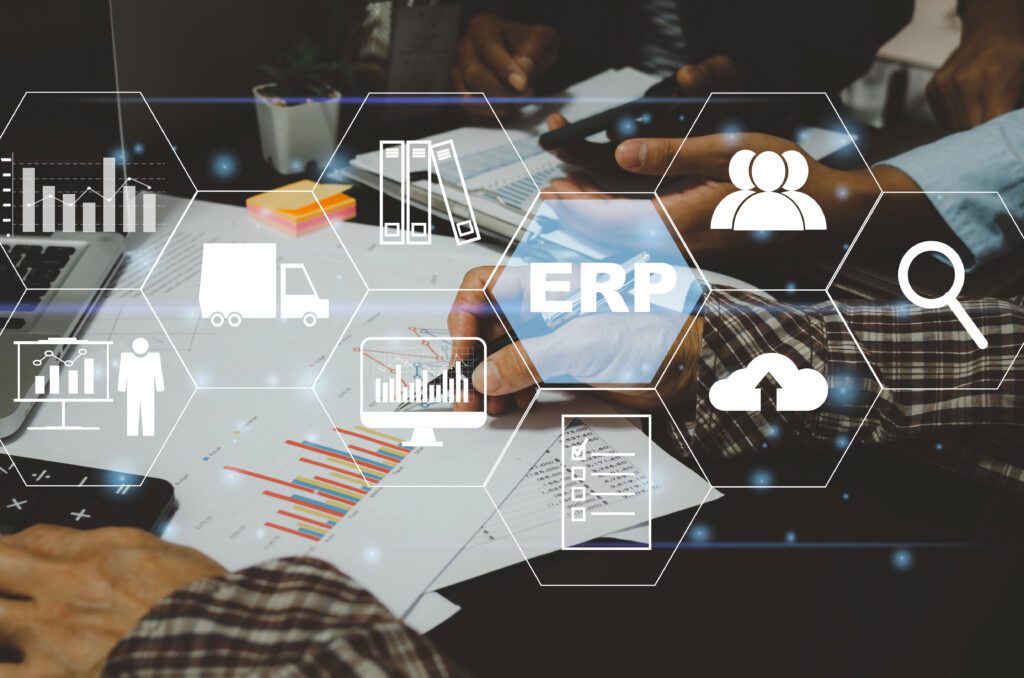In this article, we will look at the ERP system, explain its operation and the biggest benefits for businesses.
What is an ERP system?
The ERP system (Enterprise Resource Planning) is an integrated software system that serves for effective planning, management and monitoring of various business processes. It is a complex tool that unifies information and data from different areas of the company into one center.
The ERP system is like the nerve center of the modern business environment. It ensures compliance and coordination of all activities - from production to logistics to customer relationship management. Thanks to the centralization of data, it offers the company management an overall view of the functioning of the organization.
How does ERP work?
The ERP system is composed of various modules and functions that work together to integrate various activities of the company. The main modules include:
1. Finances:
– Tracking finances: This module enables detailed monitoring of all financial transactions in the company. From recording income and expenses to generating financial reports.
– Accounting: Integration of accounting processes, including general ledger management, invoice registration, and tracking of tax obligations.
2. Production:
– Management of production processes: The ERP system enables the planning and management of production operations, from the tracking of input raw materials to the planning of output products.
– Inventory tracking: Centralized inventory records enable quick and accurate monitoring of the availability of raw materials and finished products.
3. Human resources (HR):
– Staff administration: Ensures complete records of employees, including information on employment contracts, attendance and performance evaluation.
– Wages: It automates payroll calculations, eliminates errors associated with manual processing of payroll processes.
- Training courses: Monitors the training and development needs of employees, thereby contributing to the development of qualifications in the organization.
4. Distribution:
– Distribution management: It allows you to monitor and manage the entire distribution process from storage of goods to delivery to customers.
– Stock tracking: It provides real-time information on current stock, minimizes losses associated with unnecessary storage or lack of goods.
5.CRM:
– Customer relationship management: It records and tracks all interactions with clients, enabling a personalized approach and a better understanding of their needs.
- Marketing: It helps to plan and manage marketing campaigns, track success and gain information about customer behavior.
Each of these ERP system modules plays a key role in ensuring overall visibility and efficiency in various aspects of business operations. Their integration enables complex management of resources and processes in the organization.
Benefits of the ERP system
- Centralized data: One source of data for all departments, which eliminates duplication of information.
- Increased efficiency: Optimizing processes leads to faster decision-making and higher productivity.
- More precise planning: Thanks to better inventory tracking and production processes.
- Improved cash flow management: Financial tracking and invoicing processes are more efficient.
- Better customer relationship management: CRM the module helps to personalize and improve customer service.
- Reliable data analysis: Generating detailed reports and analyzes for informed decision-making.
- Increased transparency: Access to data enables better traceability of processes.
- Consistent practices: Ensures adherence to standards and procedures throughout the organization.
- Better compliance: Data tracking and management for various industries.
- Improvement of corporate relations: Quick and accurate response to changing customer needs.
ERP system and its implementation

If you are thinking about implementing an ERP system in your company, we recommend that you contact the experts in the field of information technology at Amcef. Our team is ready to provide you with advice on choosing the most suitable ERP system, adapt it to the specifics of the company and ensure a smooth implementation. It is with Amcef digitization of businesses simple.
The implementation of the ERP system proceeds as follows:
Planning and needs analysis: Planning and analysis of needs are key phases in the implementation of an ERP system. At this stage, it is important to clearly define the goals that the organization wants to achieve and to identify the processes that need to be optimized. Gathering information about existing systems, employee needs and future development trends is essential for successful implementation.
Choosing a suitable ERP system: Evaluation of various options and selection of the system best suited to the company's needs. Choosing the right ERP system is a key decision. An organization should evaluate the various options based on its needs, recognize the strengths and weaknesses of each system, and consider future expansion or modifications. The implementation should be in line with the company's strategy and support its growth and development.
Customizing the system: Configuration and adaptation of the ERP system according to the specific requirements of the company. Every company is unique and may have different requirements. After choosing an ERP system, the adaptation phase follows, where the system is configured according to the specific requirements of the company. This may include setting up workflows, modifying existing modules or adding new features as needed.
Employee training: Ensuring that employees are able to work effectively with the new system. Effective employee training is essential for successful implementation. It allows employees to adopt new procedures, improve their skills and minimize resistance to change. Training should be tailored to individual job roles and related to their day-to-day tasks.
Gradual implementation: Dividing the implementation into phases in order to minimize the impact on the normal operations of the company. The implementation of the ERP system should be gradual and managed in phases. Gradual deployment of individual modules or functions minimizes the risk of errors and allows the organization to adapt to change gradually. This reduces the impact on the normal operation of the business and enables better control over the entire process.
Testing: Thorough testing of functions and processes before full deployment. An important step is testing in a real environment before full deployment. The test of all functions, integration with existing systems and identification of possible problems enables their quick solution before significant impact on operations.
Deployment and monitoring: Gradual start-up of the system and monitoring of its performance. The deployment of the ERP system should be properly planned and coordinated. Gradual start-up enables immediate response to potential problems. Monitoring the performance of the ERP system is important for identifying and solving potential problems.
Optimization and maintenance: Regular updating and maintenance of the system to ensure its efficiency and flawless functioning. After successful implementation, regular updating and maintenance of the ERP system is key. Updates ensure that the system remains in line with the latest technology trends and safety standards, ensuring its long-term efficiency and reliability.
AMCEF – Your partner for digitization
The overall implementation of the ERP system represents a fundamental step for organizations towards effective management and optimization of their business processes.
The Amcef company is just such a partner, which has extensive experience in the field of implementing ERP systems and digitizing businesses. We offer various services such as custom software, hiring IT specialists or overall digitization of your business.
We can provide full support at every step of the process. Amcef specializes in individual solutions that meet the specific needs of each client.







